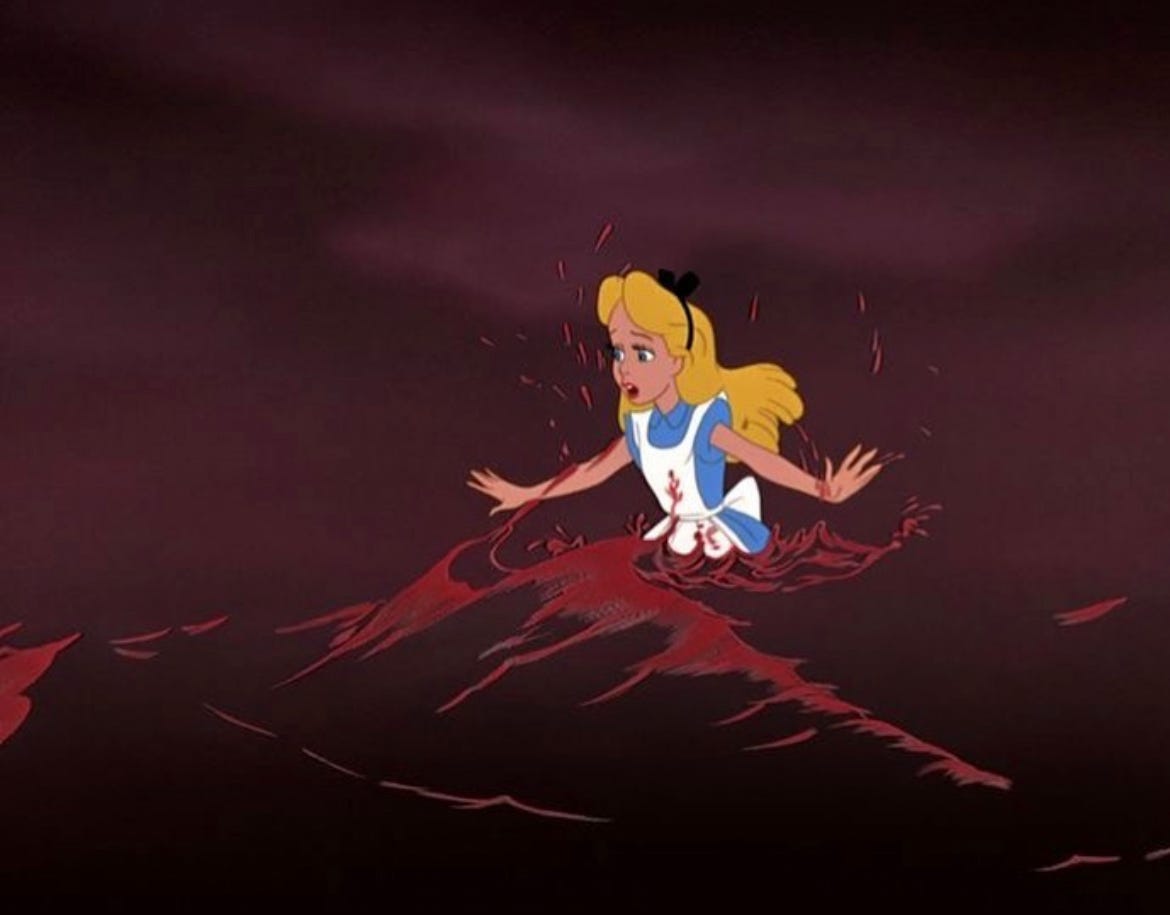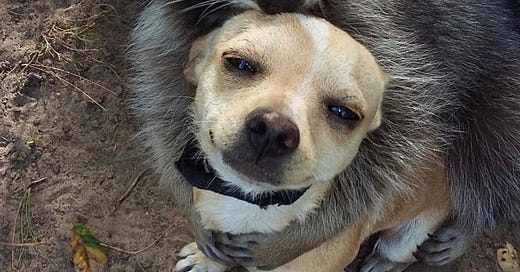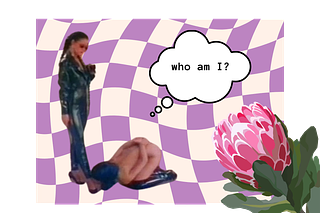

Discover more from ask a sub
Ever since I was eighteen years old, I have been locked in an argument with a girl I met as a college freshman.
Our conflict began when, over breakfast burritos, she took a messy bite and said “I don’t think bisexuality is real. If you’re not a lesbian and you’re kissing girls you’re just doing it for attention from guys.”
This was at about ten a.m. in Isla Vista, the dingy cluster of ramshackle apartments that adjoins UC Santa Barbara, famed party school and where I spent the first two years of my undergraduate education. She made this fraught comment as we watched the un-showered masses amble zombie-like from the floors where they’d passed out surrounded by strawberry-flavored rolling papers and discarded red solo cups, back to the floors covered in unwashed bongs and flaming hot Cheeto bags where their own mattresses lay.
It wasn’t that Abby’s comment was new to me, I’d seen bisexual representation in the media (Black Swan, Olivia Wilde on House M.D., end of list) and knew that people generally considered bisexual women to be slutty for attention and bisexual men to be on a “layover on the way to Gay Town” (oh, that’s right, there was also that one extremely cursed episode of Sex and The City). What made her observation interesting was that the night before, my straight friend Sam had kissed me for attention at one of those dirty parties. As she had been in the habit of doing at almost every party we’d been to together. Ever since she took me to a frat house during rush and we’d been bonded for life after witnessing a couple having sex in the sand of a beach volleyball court. At two p.m.
As I shrugged off one Attention Kiss after another, there was one more trope from TV and movies that lingered in the back of my mind. As an inexperienced teen (before becoming the instigator of many rounds of spin the bottle with my high school friends), I’d fixated on the scenario where, for one reason or another, a gay person kisses a straight person, pulls back, and pronounces, “yeah, you’re definitely straight” (I think SATC again?) In my young mind, all I needed to do was find a lesbian who could do this kind of diagnostic test on me and confer my bi status as real. “This girl isn’t straight,” she’d proclaim, shocked. “She’s my son!” Wait…
But here in college, as I still felt unsure of whether I could claim the bisexual label as my own, I was the one running the diagnostic tests in one fraternity living room after another. Because whenever my friend Sam kissed me for attention, I was absolutely certain she was straight. It was the scrunched eyes, the tight lips lingering just long enough for the boys around us to cheer. Then, invariably, she’d go off with some frat boy, and I’d drift towards the midnight view of the sea, visible as it was from every party house balcony, pining as though for my shipwrecked love — or a hypothetical girl who actually wanted to kiss me. Invariably, the foamy splash of a failed keg stand would wake me from my reverie, stain my Going Out Top, and remind me that letting Sam use me for this purpose was probably not the best for my self esteem.
So when Abby passingly, bitterly, maligned bi women, I knew for sure she was talking about me. Up to that point, I’d seen accepting these attention kisses as my duty as a bisexual wingwoman. But now Abby was suggesting that my doing so was somehow… offensive to lesbians? Despite the shakiness of her argument, my self-loathing cheered her on. Yes, the internalized biphobia ghoul inside me concurred, not only am I a slut… but no one will ever love me! Yes!
To her credit, Sam leapt to my defense, lending some standard early 2010’s talking points to the conversation about how people are born that way (Lady Gaga hadn’t forgotten that one important syllable for the bis in her anthem that can still make me a little teary on an off day).
Despite Sam’s fair-weather straight allyship the first time the issue arose, that day was the beginning of the argument I would have with Abby on and off for the subsequent twelve years. Why would I stay friends with this seemingly unimportant girl from college for almost half my life? Well, I didn’t. But that’s how long I’ve been fighting with her in my head.
I think by the time any queer person comes of age, we are buckling under the weight of other people’s projections, misinformed comments, and regurgitations of bad media representations. These comments, whether we realize it or not, live on rent-free in our heads long after their perpetrators have moved on. Abby may have forgotten all about that conversation even a day later, whereas I’ve been fighting with her in my head for twelve years. With the Tumblr posts that told me the “bi” label is transphobic for at least seven. With my own question of whether I belong for about thirty.
And for those of us who are both queer and kinky, I think society’s game of Pin The Misinformed Projection On The Donkey has left our asses unbelievably abused and raw. And not in the fun way some of us so crave.
When I was twenty-five the sub swoons hit me hard. I was obsessed and didn’t care who knew it. So on the night that I decided to tell my broader friend group what a very nice older man was doing to my flesh vessel a couple times a week, I had no doubt in my mind that my submissive renaissance would be hailed as good news. I believed this despite the fact that conversations with female friends in this era of life tended towards comedic routines about how terrible men were and how exhausted we all were over trying to find someone decent to have sex with. As long as you were miserable, the joke continued.
But on that night, I was about to commit the ultimate betrayal. I was about to abandon the joke and admit that I was hopping off the terrible one night stand rollercoaster for a while. In fact, I was about to be so cringe as to admit that I actually had feelings for someone. A crush, even.
The phrase “Dom/sub play” had barely left my mouth when one friend interrupted me, scoffing, “wait — you’re the Dom right?”
My stomach lurched. I had been certain the night was going to be all sleepover giggles and telephone cords twisted around our popcorn-sticky fingers.
“No, actually I’m the sub,” I confessed.
“Weird,” she said, the same derisive, humorless laugh in her voice. “I thought you were a feminist.”
I listened to her elaborate on her opinion that the only ethical Dom/sub play between men and women is one where the woman is the Dom and is inflicting cruelty and pain on a male sub as a means of exacting revenge on him for patriarchy on behalf of all women. I’ve seen this take a few times since then and every time it bruises me deeply. It fundamentally misunderstands D/s as an exchange of power among equals, that absolutely should never be used for purposes of revenge or harm.
Needless to say, my (former) friend’s comment about feminism has been living rent-free in my head for almost six years now. It has full-on squatter’s rights. I basically have a doctorate in it.
And no matter how many times in my career since then I’ve taken to the internet to proclaim that Submission! Can! Be! Feminist! If! You! Choose!, the moment I hear anything to the contrary it’s like I’m back in that dark bar, scanning my other friends’ impassive faces for some kind of lifeline, loathe to step up to the plate and speak up for myself.
I mention the ghosts of these arguments, because I see this phenomenon play out on a community level around Pride every year. Every June I see kink accounts dredging up the “kink belongs at Pride” Canva posts, think pieces, and impassioned tweets. And these come up with good reason! Back in 2020, and perhaps a little bit in 2021, some people on Twitter got up in arms about visible kink at pride. Some went as far as to say that if you can perceive a stranger as kinky, even if they aren’t doing anything sexual, that is a consent violation on the viewer. This elicits a big eye roll from me (if I perceive someone as heterosexual is that like watching them have sex? Give me a break.), but I won’t get too deep into the weeds of explaining why this take doesn’t make sense. It’s been done well many times over. Sometimes by me.
When these takes come about online, some of us tend to feel a bit mystified. “Anti-sex queers,” we think, “what century is this?” How one can even use the word queer to describe themselves and go on to sexually shame others on Twitter is in itself baffling. Until you realize these piping hot takes tend to be coming from Gen-Z. Who, if you remember, were mostly in high school and college in 2020 (if not middle school), doing their schoolwork remotely, then clicking over to Twitter to get into vicious fights with any adult who would take the bait. They most certainly were not at frat parties being kissed by their straight friends. And for that they deserve a shade of pity.
This year however? And last year? I have not been seeing as many anti-kink takes in queer spaces (and believe me, I would, because not a one goes by that people don’t send me). But you know what persists? The rallying cries from the kink community that we belong. Because we do! We do belong. But at the same time, maybe we need to consider that we’re fighting with the ghosts of some very upset kids who have since grown up a little.
And if these kids are anything like the ghosts of my own past, these kinds of 140 character knee-jerk reactions are not directed at you, they’re just repeating what they are saying to themselves. A good chunk of the biphobic comments I ever received came from people who later identified as bi. A laughable number of kink-negative takes I got in my early swoons phase came from people who later asked me for the roadmap to becoming a sub themselves.
If the rumors are to be believed, the discourse laser beam seems to now be pointed at polyamory at pride. And while that’s not my fight, I wonder if I might remind everybody that no matter who you are or what you’re doing, you will find someone online who hates you. That’s just part of life whether you’re someone who stores their sliced bread in a socially-unacceptable way (twist and tuck team for life!!) or someone who calls their polyamory a sexual orientation. People are gonna be mad.
This is not to discount the wider societal issues that come up at Pride. Yes, discussions of who is included and general in-fighting have been deeply damaging to our communities in the past (see this article about the intersection of kink and queerness where I traced anti-kink animosity in gay communities in the nineties).
But now? Has your local Pride installed a Gen-Z outfit checker at every ingress, collecting a heap of discarded leather like so many water bottles at TSA? Are there undercover agents hopping off of the floats to check the certified queer licenses of every member of your polycule? I didn’t think so. And as more and more corporations seem to be bailing on us, I would argue that now is the time to free your mind from the discourse, and live out loud. Be confrontational, be visible, be seen. We are allowed to disagree. What we don’t want is people turning away from much-needed community in the times we’re living in.
bell hooks defined the word Queer “not as being about who you're having sex with (that can be a dimension of it); but 'queer' as being about the self that is at odds with everything around it and that has to invent and create and find a place to speak and to thrive and to live.”
The internet makes the being at odds part easy, natural, and part of our daily routine. We’re not only at odds with the larger, heteronormative, Vanilla society, but we are at odds within our own identity groups. Queer people and kinky people and non-monogamous people are great at being at odds with everything around us, including members of our own. We’ve got the ‘being at odds’ part down pat.
But when was the last time you invented? Created? Found a place to speak and to thrive and to live? In this era of terrifying legislation, internet atomization of our communities, and ever-escalating in-fighting, I think it’s time to be bold enough to not just argue, but create. To ask ourselves, at this crucial inflection point, who can we be going forward? Who can we save? Who can we include? Who makes us stronger?
Pride is a street fair. The question of “is [x] allowed at Pride” is a fundamental misunderstanding of public space and community in general. Everyone is allowed at Pride. There are no gates to keep. But beyond whatever day your specific city or community celebrates it, Pride is a feeling. And not just that, Pride is a protest. And protests require solidarity. They require people showing up. Not just people who have the receipts and experience to “prove” their queerness, but straight allies too. Personally, I don’t give a single shit if poly people show up at Pride. A lot of them are queer! What are we even talking about!!
I think my point with all of this is that the arguments we have in our heads are holding us back from building community today. Arguing with the ghosts of judgements past is distracting us from celebrating the numbers we do have. There are a lot of us, and together we have so much potential. And squabbling amongst ourselves about who is allowed at Pride is doing fuck all to protect the trans kids in red states.
So I hope that you’ll join me this Pride in releasing the ghosts of arguments past. Personally, I’m replacing the floats in my mental pride parade with my very own imaginary funeral pyre, and loading it up with my college acquaintance Abby, my misguided feminist friend, and all the media representations conscious and unconscious that told me I was sick, wrong, and slutty (not in the fun way I’ve reclaimed). And with them, I release my need to argue with anyone who’s not standing right in front of me right now. I’m clearing my mental space so I can thrive and live and reach a hand behind me to help some of those young queers up the ladder to see the view.
So as I set these ghosts adrift on the midnight sea, I hope you’ll salute them with me, and warm yourself by the conflagration of the heap of their bullshit I’ve been dutifully turning over for decades.
And from that manure, let rise a movement.
We are at an inflection point for sexuality creators online. Algorithmic social media platforms have become structurally hostile to discussions of sex, so independent, crowd-sourced support is most creators’ only shot at making a living. If my work is important to you, please consider subscribing to the paid side of this Substack, or to my Patreon.
On both Patreon and the paid substack, you’ll receive monthly link roundups and full-length Deep Dive interviews with luminaries from the alternative sexuality communities, but if you’re looking for a community component you’ll find that on Patreon. Wherever you choose to join, words cannot express my deep gratitude for the folks who have shown their support for nuanced conversations around sex, intimacy, and eroticism. The personal is political. Now more than ever.
The online courses still exist as well! Here you can find Conscious Kink, the guide that has helped hundreds of people co-create satisfying D/s dynamics, and Sub Survival Guide, the just-add-water guide to safely taking your subby desires from dreaming to doing.
Subscribe to ask a sub
bound at the intersection of vulnerability and abject horniness

















This is an absolutely fantastic post. Thank you.